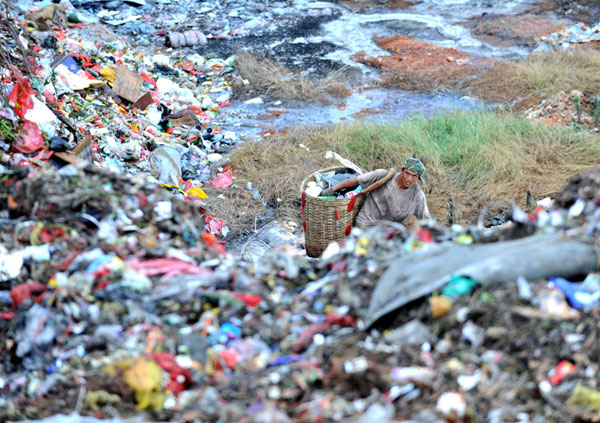|
 A garbage collector at a dumpsite in Nanning, capital of South China’s Guangxi Zhuang autonomous region, in July. [Photo/Xinhua] |
Officials will be subject to administrative punishment if they fabricate environmental statistics or refuse to release information that should be made public, according to a draft amendment of the Environmental Protection Law.
The draft law, which was presented for discussion by deputies of the National People's Congress Standing Committee on Monday, stressed the government's role in environmental protection, as China faces increasing environmental incidents and protests.
It is the first major revision of the law since it was introduced in 1989.
Wang Guangtao, director of the NPC Environment Protection and Resources Conservation Committee, said the main purpose of the amendment is to reinforce the responsibility of governments and enterprises.
For example, under the proposed draft, environmental protection is also a compulsory target for the performance evaluation of local officials.
Such requirements are currently only imposed on officials when they fail to meet family planning targets, or if the number of kids who have dropped out of school within their precincts has exceeded the allowed number.
In addition, on a regular basis governments are required to release information about a number of issues, including the quality of the local environment and the use of pollution fees.
The draft law is a reflection of growing public awareness and increasing participation in environmental protection, experts said.
Two environmental disputes with nationwide repercussions occurred in July.
Residents in Shifang, Sichuan province, took to the streets to boycott the construction of a copper alloy factory, which they feared would pollute the water and air. The government eventually scrapped the multi-billion-yuan project.
Shifang's protest was followed by a similar incident in Qidong, Jiangsu province, where the government was forced to permanently cease all work at a foreign-invested waste pipeline project. The government made the decision one day after thousands of residents rallied at an intersection, where the city government is located, to protest the planned water pipeline.
Experts said the amendment would bring the law up to date and help address imminent environmental conflicts.
The draft expanded the stipulation regarding government responsibility, which includes only one general clause, into a complete chapter with detailed explanation on the government's obligations.
Cao Mingde, an environmental law professor at China University of Political Science and Law, said the number of duty dereliction cases is increasing, and one important reason is that there is a lack of legal bounds on government officials.
Environmental protection authorities are also required to deliver reports to local people's congresses to review their work. Specific reports will be handed in if environmental incidents take place.
As for enterprises, the draft requires them to cooperate with local environmental protection officers to carry out on-site investigations, such as providing accurate statistics as well as the operation and maintenance of cleaning equipment.
Cao said the proposed obligation on companies is meant to plug existing loopholes in the law enforcement of environmental protection officers.
Cao said enterprises often dodge government inspections by claiming that they could expose business secrets, and some discharge pollution during the night and on weekends.
"A detailed definition of rights and obligations of the governments and companies can improve law enforcement," he said.
Cao also argued that it is unrealistic to wholly rely on the government to crack down upon polluters, noting the importance of public involvement.
"For instance, environmental protection in rural areas requires more social resources than in urban places, since there are no environment offices under county-level governments," he said.
Contact the writer at [email protected]
